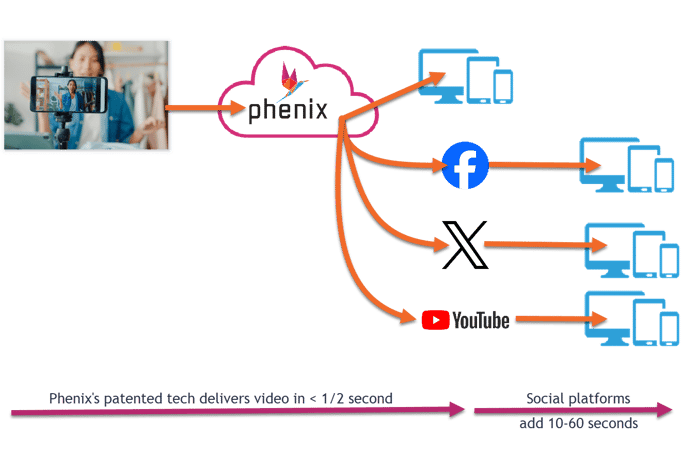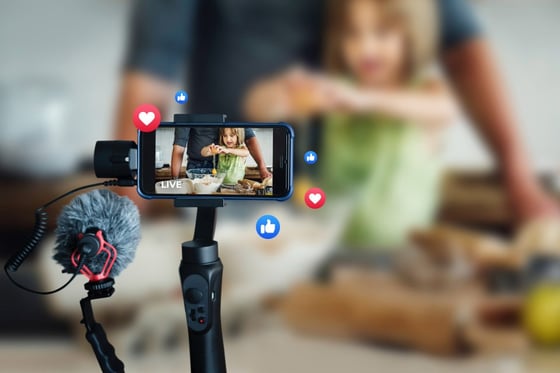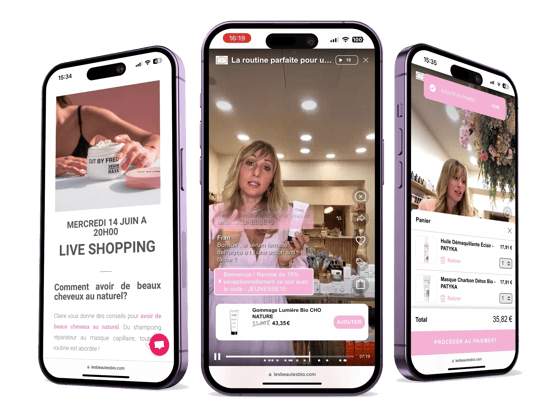In today’s digital age, businesses are constantly looking for ways to streamline their distribution while reaching a wider audience. One effective way to achieve this is through re-streaming content to social media. This process involves taking a live video stream and broadcasting it simultaneously on multiple social media platforms, such as Facebook, YouTube, and X.
In this article, we’ll explore the advantages of re-streaming to social media and how it can benefit your company’s content distribution and social media presence.
Streamlining Distribution with Low Latency Video Streaming

One of the main benefits of re-streaming to social media is the ability to streamline your content distribution. By broadcasting your live video stream on multiple social media platforms, you can reach a wider audience and increase your brand’s visibility.
To offer the best possible viewing experience for this wider audience, however, your live video stream must start out with ultra low latency because re-steaming to social media will add latency. This means that the wider audience you reach by re-streaming to social media may be experiencing a live streaming delay of up to 60 seconds or more.

This may seem confusing at first, but with online video streaming, it’s important to understand that live and real-time are not the same. Real-time video streaming means the delay between the time the live event is broadcasted and when it is seen by viewers is less than a half-second.
Every year, Phenix conducts a Super Bowl latency study to measure the time difference between when something is seen on the field of play and when it is seen by viewers. For the 2023 Super Bowl, we observed average latencies of over 60 seconds and drift at more than 90 seconds. These delays create disjointed viewing experiences for your audience.
Building out the infrastructure for real-time video streaming can be cost prohibitive for most organizations, but low latency video streaming is crucial for creating a number of engaging, interactive experiences that maintain the attention of your audience and provide a seamless viewing experience. That’s why Phenix put in the hard work to design an industry-leading platform with proven experience scaling real-time video streaming to more than 500,000 concurrents with less than ½ second live streaming delay.
By using a low latency streaming service that focuses on real-time video streaming at scale, you can ensure that your live video stream is delivered to social media platforms without significant live streaming delays that compound one another. This allows you to engage with your audience in real-time and create a more interactive experience.
Content Distribution and Amplification
by KAL VISUALS (https://unsplash.com/@kalvisuals)
Re-streaming to social media not only helps you reach a wider audience, but it also amplifies your content distribution. By broadcasting your live video stream on multiple social media platforms, you increase the chances of your content being seen and shared by a larger audience.
This can be especially beneficial for businesses that are looking to promote a new product or service. By re-streaming a live product launch or demonstration on social media, you can generate more buzz and interest around your offering. This can lead to increased sales and brand awareness.
Additionally, re-streaming to social media can also help with content amplification. By broadcasting your live video stream on social media, you can encourage your audience to engage with your content and share it with their own followers. This can lead to a snowball effect, where your content is seen by an even larger audience, resulting in increased brand exposure and potential new customers.
Social Media Engagement and Presence

Re-streaming to social media can also have a positive impact on your social media engagement and presence. By broadcasting your live video stream on multiple platforms, you can reach a wider audience and encourage them to engage with your content.
Live video streams tend to have higher engagement rates compared to pre-recorded videos, as they create a sense of urgency and exclusivity. By re-streaming your live video on social media, you can tap into this engagement and create a more interactive experience for your audience.
Additionally, re-streaming to social media can also help improve your social media presence. By consistently broadcasting live video streams on social media, you can establish your brand as a thought leader and increase your credibility. This can lead to more followers and a stronger social media presence overall.
WebRTC Video Streaming for Live Commerce

Live commerce, also known as social commerce, is a growing trend in the e-commerce industry. It involves using live video streams to showcase and sell products to an audience in real time. This can be a highly effective sales tactic, as it allows businesses to engage with their audience and answer any questions they may have about the product.
Re-streaming to social media using WebRTC video streaming technology can be a game-changer for live commerce. WebRTC, or Web Real-Time Communication enables real-time communication between browsers and mobile applications. By using WebRTC video streaming, businesses can broadcast their live commerce events on social media with low latency and high-quality video.
This allows for a more seamless and interactive live commerce experience, which can lead to increased sales and customer satisfaction.
Shoppable Video for Social Media
.png?width=560&height=319&name=Screenshot%202024-01-24%20094548%20(1).png)
Another benefit of re-streaming to social media is the ability to create shoppable video content. Shoppable video involves adding interactive elements, such as product links or purchase buttons, to a video. This allows viewers to make a purchase directly from the video, without having to leave the platform.
By re-streaming your live video stream to social media, you can incorporate shoppable video elements and turn your live commerce events into a social media shopping experience. This can be a highly effective way to drive sales and increase social media engagement.
Real-World Examples of Re-Streaming to Social Media
Roll On Jade
Roll On Jade, a boutique French beauty brand specializing in innovative, energized beauty, is an example of successfully utilizing re-streaming to social media. To increase the number of participants for its live shopping events, Roll On Jade re-streamed its live shopping events to Instagram.
Thanks to restreaming on Instagram, Roll On Jade not only benefited from an automatic push notification from Instagram to its followers every time a live shopping event started, the profile photo for Roll On Jade's page was surrounded by Instagram colors and a “Now Live” badge.
By engaging its Instagram community and inviting them to join the live broadcast on its e-commerce site, Roll On Jade quickly doubled their viewers and significantly increased viewing time and engagement rates.
Graazie
Another example is Graazie, an online jeweler who has perfected the art of giving jewelry to that special someone. By adding shoppable videos to their e-commerce website, Graazie has tripled its average session duration and increased its conversion rate by 5 fold.
Take Aways
Re-streaming to social media can provide several benefits for businesses looking to streamline their content distribution and increase their social media presence, but it does add live streaming delays for your viewing audiences who are watching on social channels.
By utilizing real-time video streaming, businesses can reach a wider audience and create a more interactive experience for their viewers. Additionally, incorporating ultra low latency WebRTC video streaming and shoppable video can lead to increased sales and engagement.
You can also leverage the power of social media to amplify your real-time broadcast and entice viewers to tune into the real-time video stream, ultimately boosting traffic to your website.
Adding re-streaming to social media to your content distribution strategy can take your business to the next level and help you to stay ahead of the competition.
To learn more about re-streaming to popular social media platforms from Phenix, read our implementation guide here: https://phenixrts.com/docs/integration-guides/restream/



